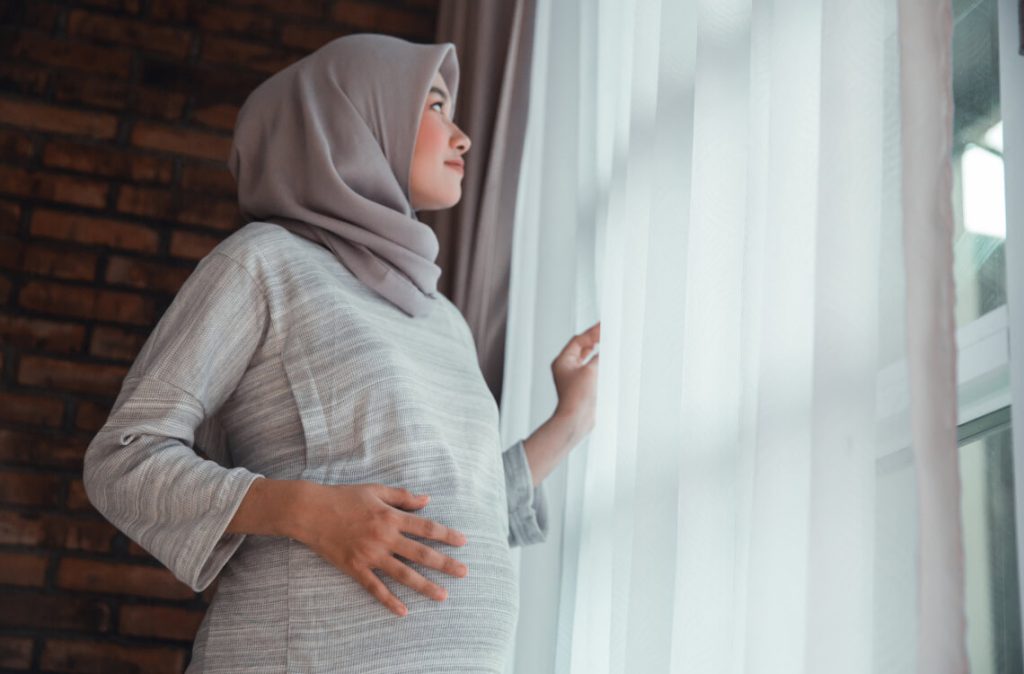The blessed month of Ramadan has returned, and one of the most frequently asked questions among mothers is, “Should you be fasting if you’re pregnant?”
While it is permissible for a pregnant woman not to fast if she fears it may put her and/or her baby at risk, some may not want to miss out regardless.
Thus, if you’re expecting and wondering how you should approach this fasting period, keep reading because we’ll go over all you need to know.
REDEEM A FREE MOTHERHOOD NEW MOM GIFT HERE
To Fast or Not to Fast While Pregnant
First and foremost, and perhaps most importantly, you should check with your doctor before deciding to fast.
Your doctor will usually advise you whether to fast throughout Ramadan. Especially if you have a complex pregnancy condition like gestational diabetes or gestational hypertension.
You should also be aware of when your body can or cannot sustain fasting.
So, never push yourself because it could potentially be harmful to both you and the growing baby.
Remind yourself that it is completely okay to not fast while pregnant if you are unable to do so.
Some health professionals recommend that pregnant women only fast for a few hours each day and take regular breaks to replenish their energy levels and prevent dehydration.
Or not at all.
Don’t be concerned about missing out, okay? Although as a pregnant woman, you are not obligated to fast during Ramadan, you can still take part in the spiritual aspects of the month.
For example, you can wake up early to pray and perform the other spiritual activities that are expected of Muslims during Ramadan.
Additionally, you can also give charity and perform good deeds, such as helping the needy and visiting the sick.
However, if you choose to fast for the entire day after receiving the ‘green light’ from your doctor, you should know how to do so safely, as well as what should you consume and avoid to keep your body and baby healthy.
Food to Eat and Avoid When Breaking Fast
Pregnant mothers should always make sure that they eat healthy foods during Ramadan. This is especially important during this time, as the body needs extra nourishment to sustain the growing baby.
When breaking your fast during pregnancy it is important to make sure that you are eating nutritious and balanced meals.
Try to focus on eating foods that are high in protein, fibre, and iron such as:
- lean meats
- fish
- beans
- vegetables
- whole grains
You should focus on eating more of the fruits and vegetables as these are packed with vitamins and minerals that are essential for the developing baby.
There are also certain foods that you should avoid and/or limit when breaking fast such as:
- any raw or undercooked meats, fish, eggs, and dairy products
- acidic or greasy foods that can cause heartburn
- sugary and processed foods, which can be high in calories and low in nutrients
- caffeine and any other substances that could be harmful to the developing baby
- any foods that are unsafe and unhealthy for pregnancy
8 Tips to Go About Fasting Safely
Fasting can have many health benefits.
These benefits include helping to maintain a healthy weight and reducing the risk of certain chronic diseases.
But if not done safely, it can also pose risks like fatigue, dehydration, low blood sugar levels, and nutrient deficiencies.
That is why you should observe the safety tips listed below to ensure the health and wellbeing of both you and your unborn baby.
- Always consult your doctor before fasting and follow their advice
- If you feel weak or dizzy, take a break from fasting and eat as usual
- Consume a good portion of meals during sahur so you have enough energy throughout the day
- Drink enough water during sahur, breaking fast, and at night to stay hydrated
- Limit physical activities and avoid strenuous activities to minimise exhaustion
- Get enough sleep so that you are well-rested for the day
- Monitor your blood sugar levels if you are diabetic
- Get plenty of rest to keep your energy levels up
Finally, the Ruling on Pregnant Women Not Fasting During Ramadan
According to the main website of the Mufti of Federal Territory’s Office, if a pregnant woman chooses to break her fast, she will fall into one of two situations:
- If she is only worried for her wellbeing, then it is permissible for her to break her fast and only qadha’ (i.e., replace) her fast.
- If she feels sorry for her foetus and the baby she is nursing, then it is permissible for her to break her fast and only pay fidyah according to the opinion of some scholars such as Ibn Abbas, Ibn Umar, Ibn Sirin, Syeikh Abu Zuhrah and Syeikh Muhammad Tahir Ibn Asyur. While according to madhhab al-Syafie, it is permissible for her to break her fast but it is obligatory for her to qadha’ her fast and pay fidyah.
Need a one-page summary of all the pertinent details about fasting while pregnant?
Click here to download our infographic on the most important tips for your convenience, mummies!
With that, we wish all expecting Muslim mums a healthy and safe holy month of fasting.
Ramadan Mubarak with love from Motherhood!
REDEEM A FREE MOTHERHOOD NEW MOM GIFT HERE
Disclaimer: The information provided in this article is for informational purposes only and should not be considered as medical advice from Motherhood. For any health-related concerns, it is advisable to consult with a qualified healthcare professional or medical practitioner.
For more insightful stories and fun recipes, stay tuned to Motherhood Story!
